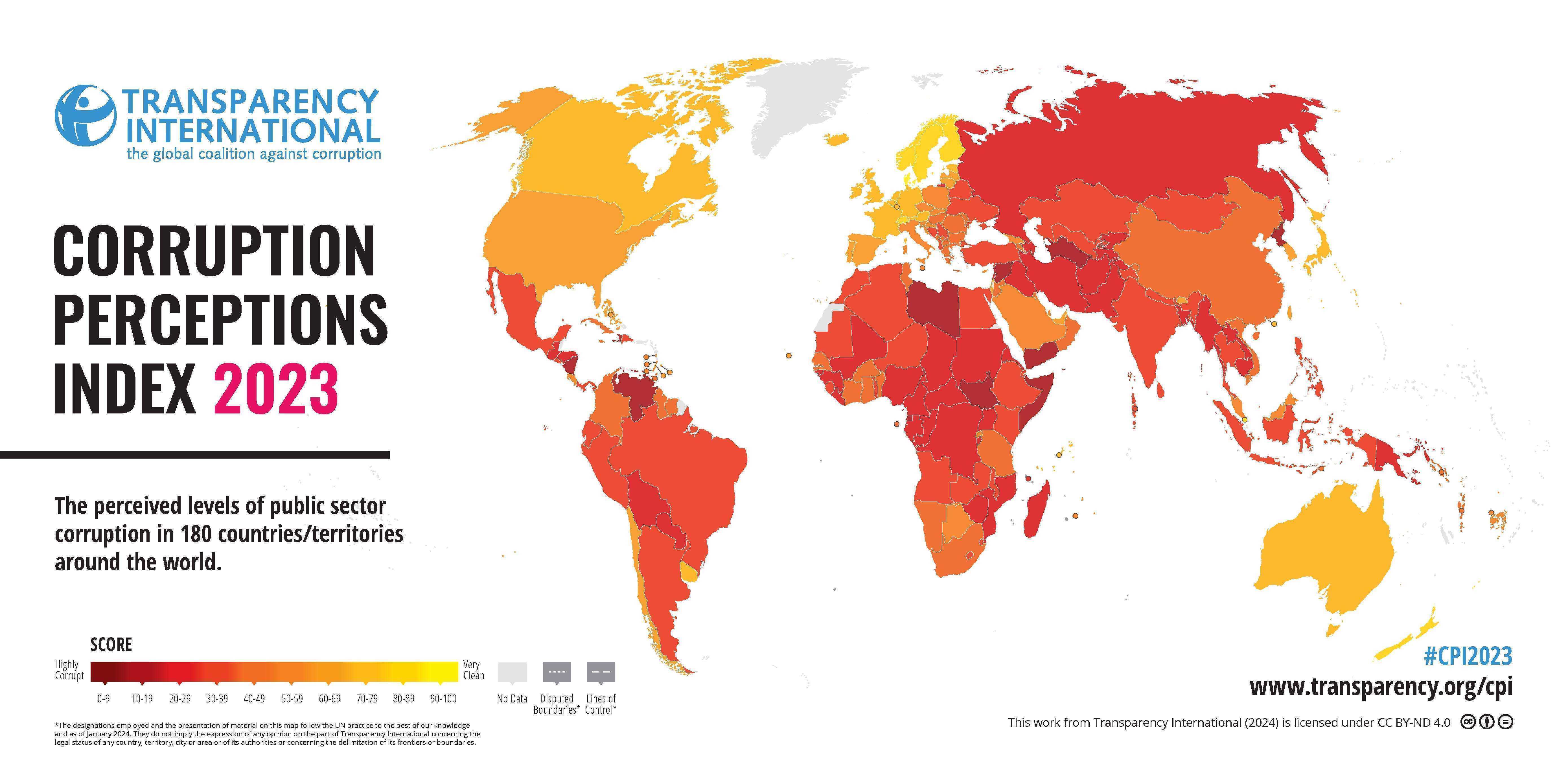Namibia stuck with corruption label
Stagnant on global watch list
Namibia is part of two-thirds of 180 countries surveyed worldwide which scored below 50 on the latest Corruption Perception Index.
Namibia has been unable to improve its score on Transparency International’s Corruption Perception Index for the third year in a row.Namibia’s score on the global watchdog’s latest index again is 49 out of a possible 100 – with 100 being a country which is corruption free.
The 2023 Corruption Perception Index (CPI), released on Tuesday, groups Namibia with two-thirds of 180 countries surveyed worldwide which scored below 50. Namibia is also part of the 90% of 49 surveyed African countries with a score of less than 50.
On the bright side, Namibia fared better than the global average score of 43 and Africa’s average score of 33.
Namibia remains at the same level as in 2014, when it also scored 49. From 2015 to 2020, the country scored above 50. Its highest CPI score was 53, obtained in 2015 and again in 2018.
No progress
Commenting on the latest rankings, the Institute of Public Policy Research (IPPR) issued a statement, titled “Namibia going nowhere on Transparency's CPI”.
“It is likely that Namibia gains credit for commencing prosecutions in the Fishrot case in the CPI. But this is counteracted by the areas where Namibia should be taking action to tackle corruption, but where we are lagging behind. As a result, while we are not slumping on the CPI, we are also not making progress,” IPPR executive director Graham Hopwood said.
Namibia needs to take a series of concerted actions in order to demonstrate its seriousness in fighting corruption and promoting integrity, Hopwood added.
Actions
Among these concerted actions urged by the IPPR are the full implementation of the Access to Information Act, as well as the Whistleblower Protection Act.
Namibia should also join the Extractive Industries Transparency Initiative (EITI), the global standard for good governance of oil, gas and mineral resources.
Beneficial ownership transparency should be enhanced through central registers that are directly accessible to a range of stakeholders within and outside government to better prevent, detect and combat corruption, the IPPR said.
It further suggested that the Electoral Commission of Namibia (ECN) should take proactive steps to ensure transparency in the funding of political parties as per the stipulations in Electoral Act.
In addition, the declaration of assets for public officials and elected politicians should be systemised to be open and transparent, according to the IPPR.
Region
Despite a regional survey ranking corruption among the most important problems that Africans want their governments to address, the 2023 CPI shows that countries in Sub-Saharan Africa have a long way to go in their fight against corruption, Transparency International (TI) said.
“The region’s persistent challenges stem from decades of severe underfunding in public sectors, exacerbated by corruption and illicit financial flows siphoning resources away from basic public services, the watchdog said.
According to TI, addressing social and economic issues remains ineffective, often at the expense of the most vulnerable population.
“Corruption in justice delivery mechanisms disproportionately affects the poorest citizens and those who depend primarily on public services, such as people living with disabilities or women and children, hindering the realization of global and regional development goals,” it added.
Despite adopting the African Union Convention on Prevention and Combatting Corruption (AUCPCC) two decades ago, impunity of public actors, a weakened civic space and public access to justice and information continue to be critical issues that threaten the rule of law in the region, TI said.
“Anti-corruption efforts are therefore necessary at all levels and by multiple stakeholders within the justice network,” it emphasised.
Top performers
Topping the regional CPI are Seychelles with a score of 71, Cabo Verde (64) and Botswana (59).
At the bottom of the regional list are Equatorial Guinea with 17, South Sudan (13) and Somalia (11).
The top-3 in the world are Denmark (90), Finland (87) and New Zealand (85).
With a score of 11, Somalia was at the bottom of the global rankings, preceded by Venezuela, Syria and South Sudan – all with 13.
“There has been a global decline in justice and the rule of law since 2016,” TI said.
“The rise of authoritarianism in some countries contributes to this trend, and even in democratic contexts, the mechanisms that keep governments in check have weakened.
“Governments across the political spectrum have undermined justice systems, restricted civic freedoms and relied on non-democratic strategies to address recent challenges, including the Covid-19 pandemic,” TI added.
According to TI chair François Valérian, “leaders should fully invest in and guarantee the independence of institutions that uphold the law and tackle corruption”.
“It is time to end impunity for corruption,” Valérian said.



